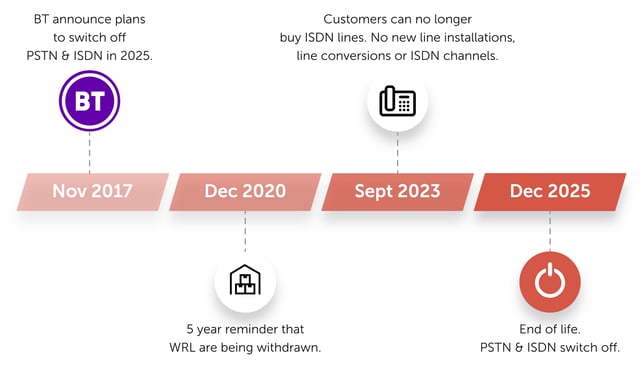In 2017 BT announced it will be switching off its PSTN and ISDN networks in 2025 in favour of IP voice services. With a gradual phase-out of the older systems starting in 2020 and from 2023 BT will stop selling the supply of wholesale line rentals, meaning all businesses will be forced to find other IP-based options for their business telephony systems.
What are PSTN and ISDN?
PSTN (Public Switched Telephone Network) is the familiar landline telephone system originally set up for analog voice communication, and became the most reliable method of making voice calls and the main carrier for internet activity across the world. ISDN (Integrated Services Digital Network) then came along, allowing the digital transmission of voice, video and other services simultaneously, using the traditional PSTN network.
Why are PSTN and ISDN being switched off?
In short, these legacy systems are out of date, as are the associated maintenance and running costs. Despite having been updated radically over the decades since they were introduced, these lines are still essentially the same in setup and design as the original phone lines of the 1800s. With all other fields of technology advancing at lightspeed around us, it makes sense that our telecoms systems are also updated.
There are still over one million businesses with an ISDN connection in the UK, all of which will be affected by the planned switch-off in the coming years. A recent survey revealed that just over 50% of UK businesses are aware of the switch off, but are yet to act. The report also found that smaller businesses with 10 - 50 employees are generally more prepared, than larger businesses with 51+ employees who appear to be responding slower.

What are the alternatives to ISDN?
The future of telecommunications is VoIP (Voice over Internet Protocol). VoIP allows people to make voice calls on a global scale using computer and mobile devices with an internet connection. The biggest and most noticeable difference between traditional ISDN and VoIP for business owners is the cost. Communications between VoIP users on the same network is often completely free, and setup and ongoing costs are massively reduced. These VoIP communication systems are also often referred to as cloud-based telephony systems.
Future-proofing with cloud telephony
Businesses large and small need to modernise their communications systems to stay ahead of the coming changes. What many businesses don’t actually realise is how many benefits this modernisation carries, particularly if they migrate to cloud telephony systems. Cloud telephony is a revelation for business communications in so many ways, and some newer systems are even more advanced and convenient than older VoIP services such as Skype.
Watch our video that explains why cloud-based phone systems are not compatible with traditional desk phones.
Advantages of using cloud telephony:
- Cost. Utilising cloud telephony significantly reduces business phone line and contract bills.
- No commitment. Cloud phone systems don’t require line rental or enforce contractual commitments, unlike legacy systems that more often than not will have lengthy contract tie-ins.
- Flexibility. Like many SaaS-based tools, cloud telephony gives you and your team the ability to use your own devices to make business calls, add and remove users whenever needed and work from any location you want.
Other benefits can vary between providers, but CircleLoop includes many powerful features as standard:
- virtual numbers : create a local presence in over 60 countries.
- conference calling : every CircleLoop users gets a unique dial-in code and room code included in subscription
- Cloud call recording : choose which call you want to record, playback, download or share the files - ideal for staff training and quality control.
In a future where IP systems, BYOD and the gig economy look like dominating the business landscape, this level of flexibility in communications is essential to ensure businesses remain relevant and agile in the coming years. This has been emphasised significantly due to COVID-19 with the need for remote working employees or teams to be able to access calls wherever they are.
| VOIP | ISDN/PSTN | |
| Cost | Very cost effective | Costly |
| Flexibility | Works wherever there is internet connection | Fixed, hardwired, immovable |
| Call quality | Relies on good internet connection | Very reliable |
| Scalability | Easy to scale | Costly and timely |
What do you need to know about the ISDN switch off?
If you’re among the one million growing businesses that still have an ISDN connection, you should start thinking about switching to cloud-based telephony sooner rather than later. Here are some top tips to consider:
What should businesses do to prepare for the ISDN switch off?
Find out when your contract is due to end or be renewed – this will give you an idea of when you can make the switch and will give you your own deadline for research.
Don’t be tempted to automatically renew your existing contracts for the sake of an easy life. 2025 may seem like a long way off, but you don’t want to risk being left behind.
Switch to cloud telephony services as soon as you are released from your current contracts – this will save you a great deal of money and time in the long run. Think about porting your numbers too, if you’ve had your business numbers for a while, it’s likely you’ll want to keep the same number when you switch. It is possible to transfer the majority of UK phone numbers to another network. You can request a number porting check on our website. Or read about how to move your number on our blog.
Begin growing new users and clients onto a cloud system – even if you haven’t fully migrated onto the cloud as a business yet, it is better to set up new users on this system rather than waste time and money adding them to the legacy system, only for this to be scrapped in the near future.
What are the next steps in phasing out ISDN?
From 2023 customers can no longer order new ISDN connections - BT will stop selling WRL. This is an extension on the previous timeline, which was to stop selling ISDN lines in 2020. The switch off is planned for 2025.
New businesses: how to future-proof your startup
Pay attention to where you’re setting up – if you’re moving into shiny new offices, make sure you do it in an area with strong internet connectivity. To ensure a reliable cloud telephony service, you need access to a reliable wifi network and 4G (soon to be 5G). If you’re in a poorly serviced or remote area, you will fall at the first hurdle.
Don’t buy outdated hardware – with the ISDN switch-off on the horizon, there’s no point investing in outdated hardware like traditional desk phones and phone lines. All of this will be obsolete in the very near future, so you’ll just be wasting your money. Plus, given remote working is going to be around for some time, it’s important to be able to access your phone system from anywhere.
Set up with cloud telephony – a cloud-based phone system for Startups will allow you to work from anywhere, grow and integrate your team seamlessly, save an enormous amount of money on lines and contracts, and maintain high levels of productivity at all times. Check out our eGuide that focuses on choosing the right phone system for your startup.
Whether you’re an established business or a growing one, making a move towards the cloud will help you stay one step ahead of the future of telecoms. And, although there’s still a few years to go before the switch off, now is a good time to start weighing up your options.
About the author
Damian Hanson is co-founder of CircleLoop, which provides cloud-based phone software to businesses.
Original article here
.png)



